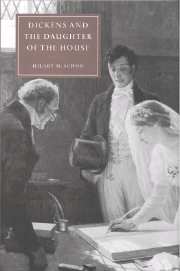Book contents
- Frontmatter
- Contents
- Acknowledgements
- Introduction
- PART I MAKING FICTIONS
- 1 The uncanny daughter: Oliver Twist, Nicholas Nickleby, and the progress of Little Nell
- PART II ON NOT COMMITTING ADULTERY IN THE NOVEL
- PART III THE DAUGHTER'S PORTION
- PART IV A VIOLENT CONCLUSION
- Notes
- Index
- CAMBRIDGE STUDIES IN NINETEENTH-CENTURY LITERATURE AND CULTURE
1 - The uncanny daughter: Oliver Twist, Nicholas Nickleby, and the progress of Little Nell
Published online by Cambridge University Press: 22 September 2009
- Frontmatter
- Contents
- Acknowledgements
- Introduction
- PART I MAKING FICTIONS
- 1 The uncanny daughter: Oliver Twist, Nicholas Nickleby, and the progress of Little Nell
- PART II ON NOT COMMITTING ADULTERY IN THE NOVEL
- PART III THE DAUGHTER'S PORTION
- PART IV A VIOLENT CONCLUSION
- Notes
- Index
- CAMBRIDGE STUDIES IN NINETEENTH-CENTURY LITERATURE AND CULTURE
Summary
Charles Dickens's early novels are a mess. Where critics have rightly reveled in their comic energy, their linguistic verve, and their anarchic plots, it is impossible not to note the incoherence that is their strongest effect, in particular the battle they seem to stage over realism and the forms the fiction is to take. That passive form is intentional, for the early novels seem to be without much narratorial or narrative control, veering uneasily in style, diction, point of view, and even genre. But these novels do offer one recurrent device that is of particular use to readers of the later fiction, something even Dickens was to note when he reread his earlier novels. When Dickens went back to this body of work to present it to readers in a more definitive form through authorial prefaces, he seized on the figure of a woman to exemplify his fictional method and morals. In virtually every case, and most strikingly in Oliver Twist and The Old Curiosity Shop, the reader looking for the author is told: cherchez la femme.
This authorial habit suggests something powerful at stake for Dickens in the allegorizing of women, but the language of these prefaces, as well as the thematic and narratorial work the figures of women are set to do in the early novels, suggests more than a simple process of allegory: Dickens's obsession with female presence and representation (and, increasingly, with female narrative power) suggests a spectacularizing of women as well, one marked out by the two very different images of women these texts offer, Nancy (the “vicious” and murdered prostitute of Oliver Twist) and Nell (“good, gentle, patient, quiet Nell”) of The Old Curiosity Shop.
- Type
- Chapter
- Information
- Dickens and the Daughter of the House , pp. 19 - 46Publisher: Cambridge University PressPrint publication year: 2000



